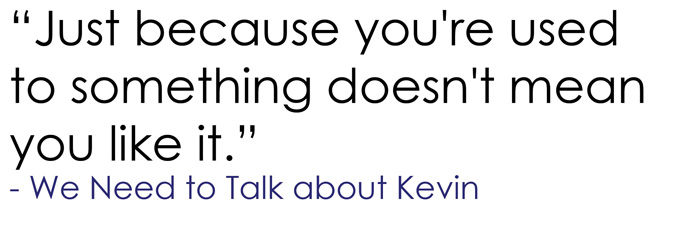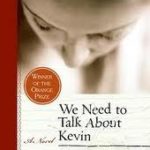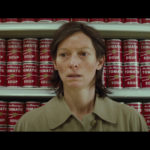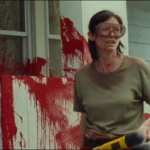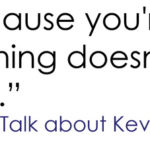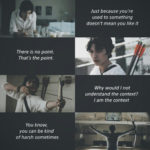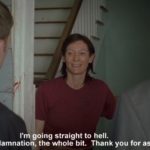Eva: Why?Kevin: I used to think I knew. Now I’m not so sure.
I’ve just caught up with Lynne Ramsay‘s We Need To Talk About Kevin, five years after the film was released to a storm of controversy. I’ve not read Lionel Shriver‘s stellar novel of the same name, the one that dared to broach the taboo subject everyone would sooner have ignored and won awards. Alas, I’ve not read the book, so can’t discuss the parallels – that can be left to others.
That the film was ignored by the Academy is one of the great scandals of recent Oscars, but it is undeniably uncomfortable viewing. There but for the grace of god… they must have thought to themselves. The timing is all the more poignant now, given the recent publication of A Mother’s Reckoning, Sue Klebold‘s book about coming to terms with the actions of her son Dylan, one of the two shooters in the Columbine school massacre in 1999. Worth starting with a quote from Ms Klebold:
“A day does not pass that I do not feel a sense of overwhelming guilt – both for the myriad of ways I failed Dylan and for the destruction that he left in his wake.”
This is an emotional analysis of a mother’s breakdown after her son commits an appalling massacre at the local school – but also of her husband and daughter, of the way in which she is viciously treated by the community after the event, and of her guilt over the failed relationship with Kevin that she blames for the tragedy. Where blame lies is the moot point, though Ramsay wisely leaves the viewer to decide. I shall return to this point.
For the most part, John C Reilly‘s husband/dad Franklin Plaskett is a peripheral figure, adopting the “Hey, Kev” approach to parenting, giving presents including the professional bow and arrow set later used for appalling and wanton destruction – including his own death; the film is really a study of Kevin (Ezra Miller in his 23-year old guise) and mum Eva Khatchadourian, at one time a travel writer but later associated totally with the actions of her son.
It’s no surprise the marriage is on the rocks, since they are truly from Mars and Venus, respectively: he has no appreciation or sympathy in respect of her problems with Kevin. She might have had difficulty forming a relationship with her son, who cries incessantly through infancy and later fails to toilet train simply to spite her. Eva tries her hardest to form a grown-up relationship with Kevin, but senses from the start that there is something dark within him she cannot understand or manage.
Kevin has his own views about his boring middle class existence and the subtext that gaining notoriety gave him something he never had before – attention:
“It’s like this: you wake and watch TV, get in your car and listen to the radio you go to your little jobs or little school, but you don’t hear about that on the 6 o’clock news, why? ‘Cause nothing is really happening, and you go home and watch some more TV and maybe it’s a fun night and you go out and watch a movie. I mean it’s got so bad that half the people on TV, inside the TV, they’re watching TV. What are these people watching, people like me?”
And to put it even more succinctly:
“I am the context.”
After the event Eva turns the other cheek while townsfolk take malicious revenge by splattering her run-down house and her car with red paint, by ostracising her, by breaking the eggs in her supermarket trolley, by telling her to her face what an evil bitch she is and even slapping her face in public – but they can’t do worse than the torture she gives herself. Interestingly, Ramsay makes Eva the most sympathetic character in the film, with undoubted blame attached to husband Franklin for shaping Kevin’s destiny – though by then he is not there to atone.
‘Why does she not ask for help?’ asks a friend. Most obvious answer that she does not trust anyone to help, but since she blames Eva first and last she would not consider herself worth helping. Maybe, like Ms Klebold, she should write a book to describe her experiences, but to take that step she would have to get past the denial and isolation stage, through anger, depression and finally accept the terrible and tragic trauma that cursed her life.
At this point, let me say that Tilda Swinton is not merely superlative but stupendous as Eva. Whatever she is doing in the here and now to try to keep up appearances, her face conveys the torture of her existence. She visibly crumbles before your eyes, a woman whose life has ground to a halt and who is haunted by circumstances. It is a towering performance, one offering depth and weight. I found it emotionally affecting without any need for histrionics. If this is not at least the equal of Meryl Streep as Margaret Thatcher in Iron Lady (for which she won Best Actress), I’m a monkey’s uncle.
For Swinton’s role to be at its most haunting, the three guises of Kevin must be credible. Between them, Rocky Duer, Jasper Newell and Ezra Miller do a brilliant job. Through Eva’s eyes they are almost the devil incarnate – you could almost see Kevin as Damien in the Omen. Miller is an actor with true presence, and the quality that Simon Hoggart used to apply to politicians, namely gravitas – “the ability to be taken seriously.” His Kevin and the punishment he applies to Eva is key to the film. You don’t and don’t need to see the massacre itself to understand its impact – and the fact that she did not end with an arrow through her heart is solely because Kevin wants only to prolong the punishment.
From my perspective, it’s a tragedy this opportunity has not been used to confront the gun debate (of the almost daily massacres in the US, how many employ a bow and arrows? And how many guns?), though you can see quite easily why this was not done. Having the film crowded out by the gun lobby would have negated Shriver’s point. It’s a sad world when the need for open debate is taboo, but for these purposes let’s consider the bow and arrow to be a metaphor for guns – easy to obtain and easy to use that side of the pond.
That apart, this is a film that is more relevant than it has ever been, given the frequency of massacres and the fact that some are at least starting to think what is the real underlying cause. Merely the availability of the means of mass murder is not enough – there has to be a psychological cause, and Shriver is suggesting you could spot it all along in Kevin’s case. Is that true of other instances, Dylan Klebold in particular?
Hindsight is a wonderful thing, as they say, but is not reasonable to think Eva could have done anything to prevent this – other than kill her son? She does break his arm at one point, though he rescues her by hiding this knowledge – both being quite sure he could use it against her at some point in the future. He leaves traps for her all the time, such as the computer virus that zaps her laptop. At what point could she justifiably think some action needed to be taken: discussing it with her husband failed, so what else could she do? What would any of us do, given that the enormity of what happened was impossible to predict – would any mother truly believe her son capable of random acts of slaughter?
On that note, time to close. But this is a film everyone should see at least once in a lifetime, at least for the debate it provokes and the breathtaking acting technique demonstrated by Ms Swinton. Would that I could award her an Oscar retrospectively…
PS. My friend, who has read the book, provided further insights after reading my review:
Nigel Dickson As ever, an insightful and thought-provoking review. As I said previously, my recollection of the film is sketchy. Reading your review, I see the film clearly covers virtually all the same ground, though in the book it was a crossbow, rather than a bow and arrow. I didn’t want to write too much before, as you had not seen the film at that stage, but your review contains all the spoilers, so I have nothing left to spoil now (or maybe I have).I think what is intended as the most shocking aspect of the novel is that Kevin’s father and sister also are his victims. Particularly as the novel is written as a series of letters to Kevin’s dad, you just assume he’s alive, presumably estranged from his wife; but he’s actually dead. But that is not the real surprise. The real surprise is (and there is room for alternative interpretation here) that Kevin does not spare his mother from the fate of his school peers, father and sister simply to make her life torture. (And I don’t think he ‘protected’ his mother from blame when she broke his arm simply as a means for future capital against her).It actually turns out that he thinks his mum is cool – she is the only one in the whole sorry tale that he has any regard for. And, when he suddenly faces the prospect of moving from a juvenile prison to a proper adult prison, all his self-sufficient, devil-may-care bravado melts away. He suddenly needs his mum, and she – being a mum – cannot help but be a mum and love him; it’s the first time he’s properly shown that he needs her. It’s the first time he’s let her be a mum to him. That’s the shock of it all: they actually love each other.
Andy Millward Fascinating. I certainly didn’t get that Kevin thinks his mum cool – it’s much more how he can find ways to make her life miserable. He has a strange way of showing affection
Nigel Dickson He does (have strange ways of showing ‘affection’ – admiration might be a better word), and that’s why it’s more of a shocking revelation than his dad and sister’s death.Andy Millward Thinking about it, the same sort of unconditional car-crash love shown by women towards men who repeatedly abuse them?

